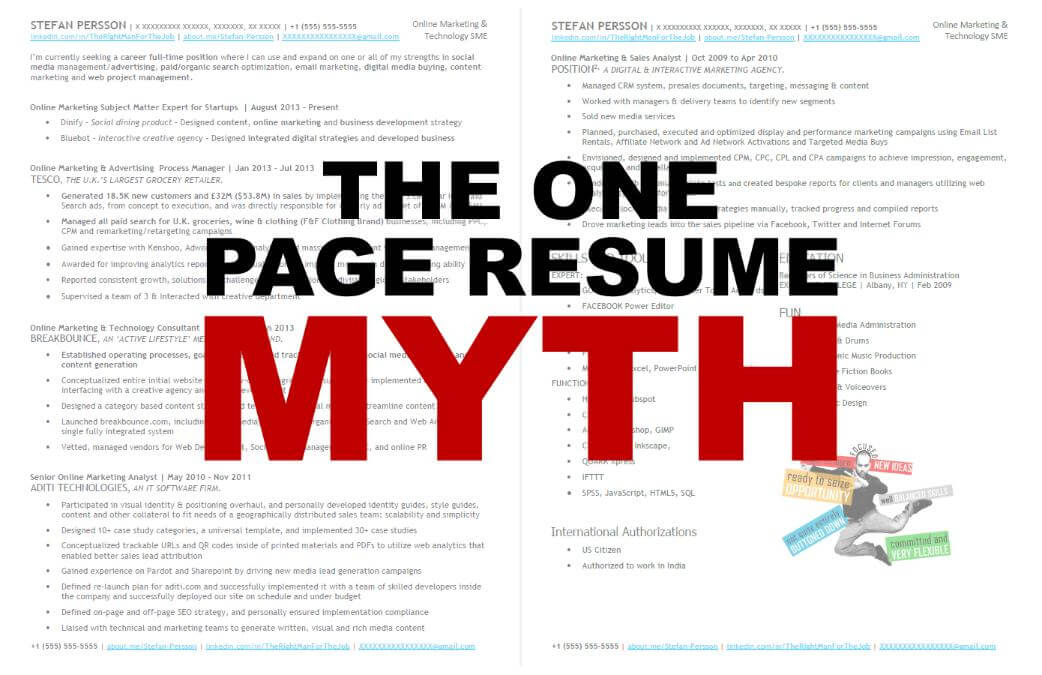
How many times have you heard “Keep your resume to one page”? Well, if you believed it then you definitely have heard it too many times and it’s a MYTH!!
The purpose of the resume is to get you the interview. Ok, I admit a resume that is too long probably won’t help your cause; conversely a resume that is too short is not going to do much for you either.
The one-page resume myth started back in the 70’s, probably by some bored HR Manager who got tired of reading resumes. I have seen some long ones in my day. I once received a resume from an engineer back in the early 80’s that was 40 pages long and bound like a hardcover book! Yes, that is too long!!
I have also seen some accomplished professionals with great credentials try to squeeze all of their background onto one page, resulting in a garbled mess, or a lot of the good stuff just left out!
Logic dictates that someone with 10 years of experience is going to have a longer resume than someone with 2 years of experience; that is why it is a ridiculous tenet to ascribe to!
Here are some key points to get you started on a new resume or a retooling of your existing resume.
1. Yes, Yes, Yes!!! Do start with an objective. I know we think that nobody reads it, but it is supposed to be there just like your name and contact info. If it’s not there it looks like something is missing. Make it a short and “sweet” statement about what you are looking for and what you can do.
i.e. “A Senior Human Resources professional seeking a position as a Human Resources Manager where I can utilize my skills and experience to make a positive contribution to a company and its employees.”
See what I did there? I defined who I am, mentioned the title of the position I am applying for, (which should earn a tag as a keyword, we will talk more about that later), and I rounded it off with what the employer would want from someone in this position.
Keywords Keywords Keywords!!!!! A large number of companies use automated matching programs to sort resumes. The resumes for each position are sorted by, yes you guessed it, keywords!! The more keywords that you match in the job description the more hits your resume will get, which will get it ranked higher and make for a much higher probability that you will get selected for an interview.
2. The next step in your resume is your Summary of Qualifications.
Your Summary of Qualifications should be in bulleted format. List all of the keywords in the job description in your summary of qualifications that apply to you.
Remember the more keywords that you match in the job description the more hits your resume will get, which will get it ranked higher and make it a much higher probability that you will get selected for an interview.
3. Education and Certifications come next. You should only include degrees that you have completed and certifications you have earned or are currently working on.
4. Next step is the Employment History- List each position you have held in histology chronologically. Include the name of the company, city and state, dates of employment, your title and a brief functional description of your day to day activities including the skills/requirements that match the job description.
5. Extracurricular Activities and Professional Memberships listed with dates and contributions chronologically starting with the most recent. (Common ground with a potential employer is always a plus!)
6. References: Make them available upon request.
Resume Size? Well I think that 1-3 pages are fine and so have all of my clients.
Save your publications and additional information, along with previous employment beyond 10 years or 3 pages, to offer as additional information in the interview!
REMEMBER…
The purpose of your resume is to get you the INTERVIEW!!!
Written by Pam Barker#2018#Blog#LeadershipDevelopment